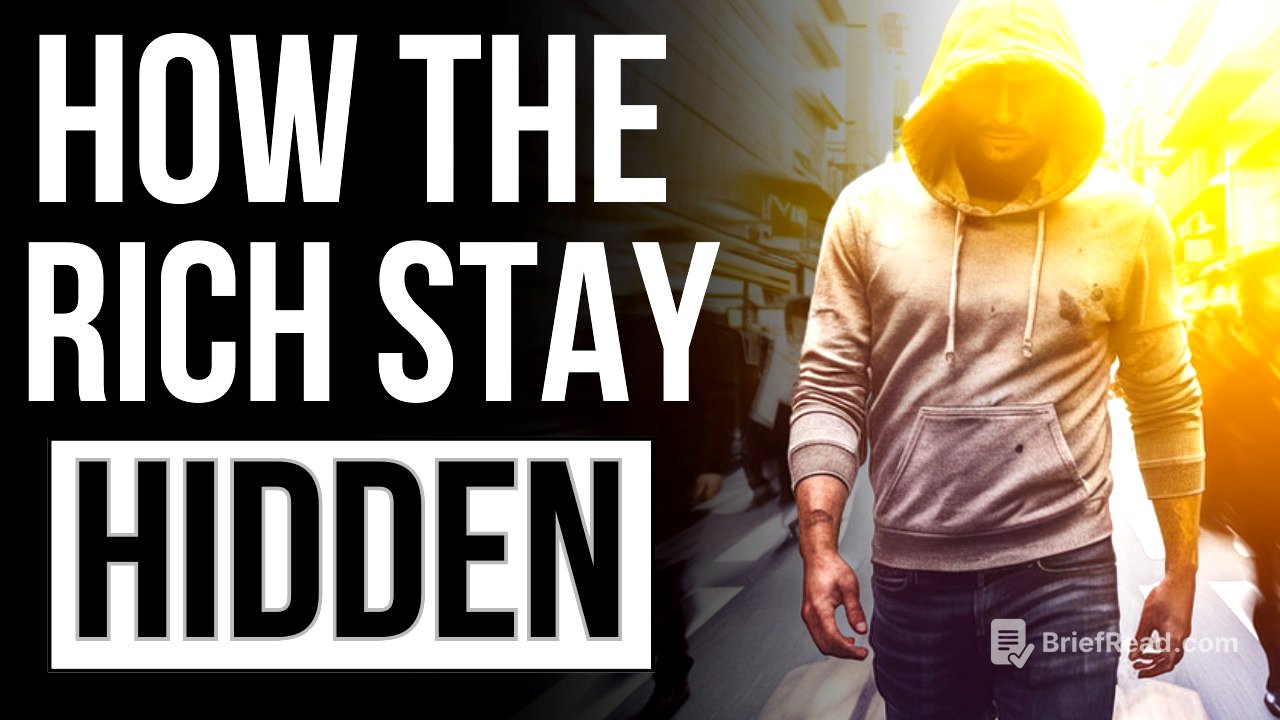TLDR;
This video reveals 15 secrets the wealthy use to maintain a low profile while accumulating and preserving their wealth. It emphasizes the importance of privacy, asset protection, and strategic financial planning over ostentatious displays of wealth. The key takeaways include buying privacy, using legal structures to hide assets, avoiding attention-grabbing purchases, raising children with a sense of financial responsibility, and redefining wealth as freedom and control rather than material possessions.
- Prioritizing privacy and asset protection through legal structures.
- Avoiding conspicuous consumption and focusing on long-term wealth accumulation.
- Raising financially responsible children who understand the value of earning.
- Redefining wealth as freedom, control, and peace of mind.
1. Buying Privacy Like It's Real Estate [0:55]
The ultra-rich prioritize and purchase privacy through gated communities, unlisted numbers, trust-owned properties, and private security. They understand that privacy is not a luxury but a necessity and a strategic line item in their budget. Unlike the average person who might throw a party when they get rich, the ultra-rich disappear, often buying properties under LLCs or blind trusts to keep their names off public records. This is done to avoid unwanted attention, lawsuits, and even scrutiny from the IRS.
2. Their Name Is Never on the Paper [1:53]
The wealthy ensure their names are not directly associated with their assets by placing them in shell companies, family trusts, and offshore accounts. This makes them legally broke but functionally untouchable, shielding them from potential lawsuits and providing control without exposure. This strategy involves owning nothing directly but controlling everything through various legal entities.
3. They Fly Under the Radar [2:45]
Many wealthy individuals avoid private jets and flashy first-class travel, opting instead for commercial flights to minimize their paper trail and avoid unwanted attention. Private jets attract attention and can increase the risk of lawsuits, kidnapping threats, and higher taxes. People like Warren Buffett still drive themselves to McDonald's and book economy flights, focusing on owning the airline rather than flexing in the air.
4. They Buy Invisible Assets That Don't Shine on Instagram [3:42]
The ultra-rich invest in assets that don't attract attention on social media, such as multifamily real estate in less glamorous areas, index funds, farmland, and storage units. These investments are not sexy or viral, but they quietly compound into multi-generational wealth. The rule of stealth wealth is that if it shines, it's probably costing you money, while if it's boring, it's probably printing it.
5. They Dress Like They Work for the People They Actually Own [4:27]
Wealthy individuals often dress in plain, unassuming clothing to blend in and avoid drawing attention to themselves. This is intentional camouflage to prevent people from asking for money, trying to sue them, or becoming suspicious. By dressing down, they reduce the risk of standing out, which can be expensive and exhausting.
6. They Raise Their Kids Like They're Broke [5:41]
Some ultra-wealthy parents intentionally raise their children to believe they are middle class, keeping the extent of their wealth a secret. This is done to instill a strong work ethic and prevent them from becoming entitled. They put their kids in public schools, encourage them to get part-time jobs, and teach them how to earn money before they inherit it. Many families use silent trusts, where children don't know they're rich until they reach a certain age, ensuring they develop grit first.
7. They Hide Money in Plain Sight Using Legal Rappers [6:48]
The ultra-rich use legal entities to protect and hide their wealth, such as generation-skipping trusts, pass-through S corporations, and 1031 exchanges on real estate. These structures help them avoid or delay taxes legally. They have teams of attorneys and CPAs who build these wealth bunkers, allowing them to potentially pay zero taxes on millions of dollars.
8. They Live on Loans, Not Income [7:45]
Many wealthy individuals borrow against their assets instead of selling them to avoid triggering capital gains taxes. They can take out low-interest loans against their stock portfolios or real estate holdings, providing them with tax-free spending power. This strategy, known as "buy, borrow, die," allows them to pass assets to their heirs with a stepped-up tax basis, avoiding taxes entirely.
9. They Use Ghost Credit Cards With No Name or Limit [8:44]
The ultra-rich use exclusive credit cards like the JP Morgan Reserve card or white-label private banking cards, which have no name, no numbers, and no limit. These cards offer concierge access, private jets, ultra insurance, and exclusive investment deals without showing up on credit reports. This provides them with privacy and power, as there is no paper trail or credit limits.
10. They Play the Long Game, Not the Status Game [9:41]
The ultra-rich focus on long-term wealth accumulation and preservation rather than short-term status symbols. They prioritize peace of mind, asset protection, and control over impressing others. They are more likely to be found at a private dinner with other billionaires than at a club making it rain. Their flex is silence and the freedom to move without being watched.
11. They Give Themselves Fake Job Titles [10:30]
Wealthy individuals often use vague or understated job titles to avoid revealing the true extent of their wealth and influence. They might say they're in consulting or real estate, when in reality they own private equity firms or control significant assets. This misdirection helps them avoid unwanted attention and requests for money or investments.
12. They Hold Multiple Passports and International Residencies [11:29]
The ultra-rich often obtain dual citizenship, residency in tax-free havens, and strategic passports to gain flexibility and avoid being controlled by a single government. They use citizenship by investment programs to move like financial ghosts, allowing them to relocate if taxes spike or lawsuits brew in one country.
13. They Use Ghost Companies to Buy Influence [12:25]
The ultra-rich use shell companies to fund companies, buy assets, or donate to causes anonymously. This allows them to control media companies, influence political decisions, and buy up land without their names being directly associated with these activities. They prioritize control over credit, making them invisible and allowing them to watch their chessboard light up from the background.
14. They Operate in Circles of Obscurity [13:17]
The ultra-rich surround themselves with layers of unimportant people, such as assistants, managers, lawyers, and drivers, who act as human firewalls between them and the public. This makes it difficult to reach them directly, protecting them from attacks and lawsuits. They build firewalls of anonymity around their wealth, making them invisible by design.
15. They Redefine What It Means to Be Rich [14:07]
The ultra-rich redefine wealth as freedom, control, and peace of mind rather than material possessions. They prioritize waking up without an alarm clock, having their time completely free, and knowing their family is protected. They opt out of the game the rest of the world is stuck in, focusing on building legacy and protecting their wealth quietly.









